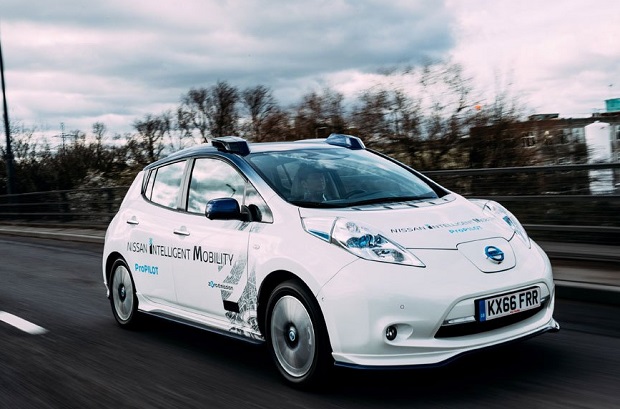Carmaker Nissan has been quietly testing its new driverless cars on public roads in London.
Using modified ‘Leaf’ models, the company says its week-long trial is the first time anywhere in Europe that autonomous cars have been let loose on the public highway.
The manufacturer put the electric vehicles through their paces around a complex route in east London, taking in stop signs, dual carriageways, pedestrian crossings and parking challenges.
The firm says the cars have clocked up hundreds of miles with no collisions and only a handful of incidents in which an engineer in the driver’s seat had to intervene to prevent a crash.
The company has also collected lots of useful data that will help it to develop the technology further.
Nissan said it had obtained permission to use public roads from Transport for London and the police.
Autonomous trials have also been carried out in Milton Keynes, Bristol and Greenwich, but only with prototype, bespoke vehicles and not on public roads in this way.
Stuart Jackson from Nissan Europe said: “We believe that zero-emission vehicles are the ultimate solution for delivering a smarter, more sustainable future. We also believe that autonomous drive technologies will revolutionise the future of mobility, providing more safety, convenience and driving pleasure for everyone.”
Nissan’s goal is to have a fleet of self-driving cars ready to go as taxis for the 2020 Olympics in Tokyo.
Additionally, Renault-Nissan Alliance announced plans to launch 10 models with autonomous driving functions in key markets globally – again by 2020.
Nissan has an ambitious plan to rival the likes of Tesla and build self-driving technology into its next generation Leaf and Qashqai models.
But selling self-driving cars is only one part of the equation: it is up to each country’s government to decide whether or not to allow motorists to sit back and let the car do the work.
Taxi app giant Uber was forced to relocate its own testing of self-driving cars from California to Arizona, following a dispute with the authorities around permission and complaints.
While the technology is moving forward at a remarkable pace, legislation may take a while to catch up.
